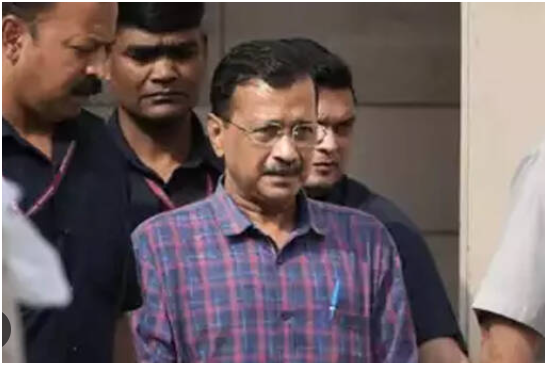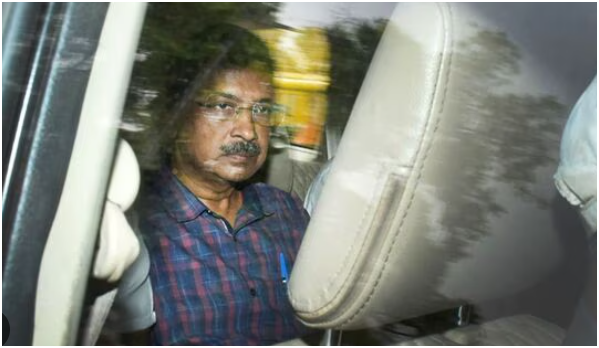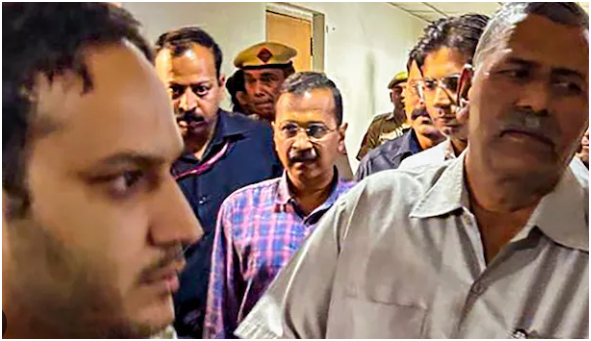Kejriwal Judicial Custody Extended: Latest Developments in the Liquor Policy Case
Kejriwal Judicial Custody: A Legal Twist in the Liquor Policy Saga
The Enforcement Directorate’s arrest of Delhi Chief Minister Arvind Kejriwal in connection with corruption allegations surrounding the city’s liquor policy has intensified the political landscape as the country gears up for Lok Sabha elections. On Monday, a Delhi court ordered Kejriwal to be held in judicial custody until April 15 in a money laundering case linked to the now-defunct liquor policy, marking a significant legal development just weeks before the electoral process commences.
Presented before Special Judge Kaveri Baweja as his Enforcement Directorate custody concluded, Kejriwal faced the prospect of extended detention as the probe agency sought a 15-day judicial custody, hinting at potential further interrogation in the future.

The Enforcement Directorate, represented by Additional Solicitor General S. V. Raju, lamented Kejriwal’s purported lack of cooperation during custody, citing his refusal to provide passwords for electronic devices as evidence of evasion. Kejriwal, prior to entering the courtroom, criticized the actions of the Prime Minister, asserting that such tactics were detrimental to the nation’s well-being.
Accompanied by AAP ministers Atishi, Saurabh Bhardwaj, and his wife Sunita Kejriwal, the chief minister’s appearance in court underscored the gravity of the legal proceedings and the political implications at play.
In response to the court’s decision, AAP leader Dilip Pandey condemned the move, alleging that Kejriwal’s arrest was orchestrated to disrupt the impending Lok Sabha elections and undermine the integrity of the INDIA alliance. Pandey decried what he perceived as a coordinated effort by various government agencies to target political opponents, casting a shadow over the impartiality of law enforcement.

Meanwhile, the Delhi High Court declined to entertain a plea seeking to restrict the chief minister from issuing orders while in the custody of the Enforcement Directorate. Instead, the court instructed the central agency to provide its comments to the special judge overseeing the excise policy case, empowering the judge to make appropriate legal determinations.
In its submission to the court, the Enforcement Directorate clarified that it had not provided any infrastructure or apparatus to facilitate the chief minister’s administrative duties while in custody, refuting allegations of undue influence or interference in governance matters.
The unfolding legal saga surrounding Arvind Kejriwal’s custody underscores the intersection of law, politics, and governance in contemporary India. As the country prepares for pivotal elections, the ramifications of Kejriwal’s detention reverberate across the political spectrum, highlighting the challenges and complexities inherent in the nation’s democratic framework.
The developments surrounding Arvind Kejriwal’s custody have triggered a broader debate about the independence of investigative agencies and the politicization of law enforcement. Critics argue that the timing of Kejriwal’s arrest, just weeks before the Lok Sabha elections, raises questions about the impartiality and motives of the agencies involved.
The AAP has vehemently denounced what it perceives as a concerted effort by the BJP-led government to silence political dissent and undermine democratic institutions. By portraying Kejriwal’s arrest as a politically motivated move aimed at tarnishing his image and disrupting the AAP’s electoral prospects, the party seeks to rally its supporters and galvanize public opinion against what it views as an abuse of power.
On the other hand, supporters of the government maintain that the actions of investigative agencies are guided solely by the pursuit of justice and accountability. They argue that the allegations against Kejriwal and other accused individuals merit thorough investigation, regardless of the timing or political implications.
The judiciary’s role in adjudicating these matters is crucial in upholding the rule of law and ensuring that justice is served impartially. As the legal proceedings unfold, the courts must uphold the principles of fairness, transparency, and due process, safeguarding the rights of all parties involved.
For the latest updates-click here.
